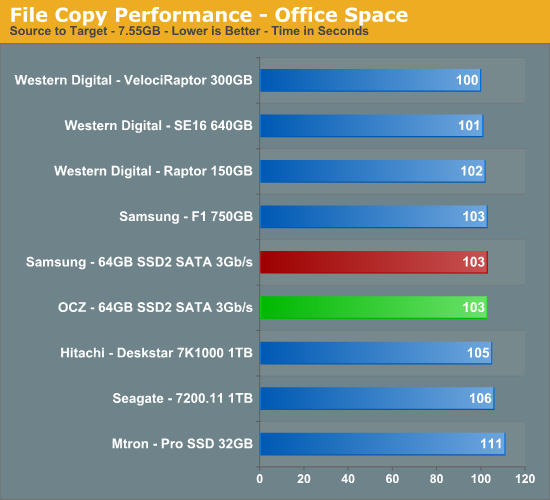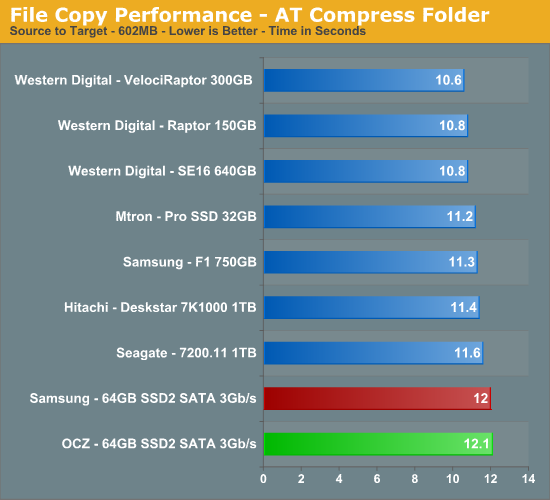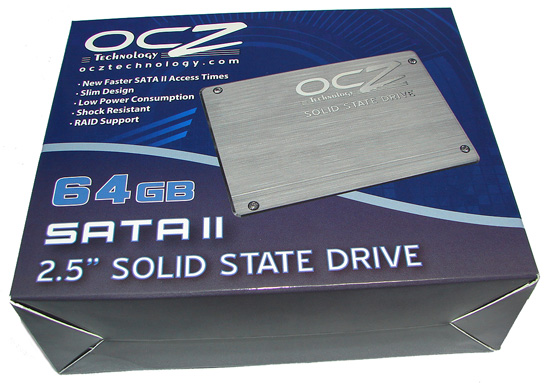64GB SSD on the Desktop: Samsung and OCZ go mainstream
by Gary Key on May 15, 2008 11:30 PM EST- Posted in
- Storage
File Copy Performance
Our file copy test measures the time it takes to transfer our first test folder that contains 29 files, 1 folder, and has 7.55GB of data from our source drive to the target test drive. The second test folder contains 444 files, 10 folders, and 602MB of data. These benchmarks are disk write intensive and require a fast storage system.


Our file copy tests show a definite advantage for the mechanical drives although the Samsung/OCZ drives were competitive in the Office Space test and scored about 7% better than the Mtron drive thanks to better controller optimizations for large sequential data blocks. However, the copy speeds for the Compress folder that features small files in a non-sequential order hamper the Samsung/OCZ drives. Even though the sequential write speeds of these drives are around 72 MB/s, the random write speeds in offline testing is around 33 MB/s in our test system.

First Thoughts
The latest "mainstream" SSD technology from Samsung has finally arrived. We now have 64GB capacities featuring 100/80 MB/s read/write rates, an ultra low-power envelope, and pricing around $16 per-GB. All right, it is hard to get excited or even speak with a straight face about the per-GB costs when mechanical drives offering the same level of performance go for 50 cents to one dollar per-GB. However, the biggest advantages of the Samsung/OCZ SSD drives is not just class leading performance, but also reliability due to the lack of moving parts, small form factor, excellent thermals/acoustics, and low power use. The target market is obviously the power notebook user, but considering the 64GB of storage, this drive would make any desktop enthusiast with deep pockets valuing top-flight performance happy.
Compared to where we were just over a year ago, it appears Moore's Law is severely behind the curve with this particular technology now. In fact, we are starting to see MLC based SSD products shipping with third generation controller technology that might change the price to performance expectations for the market. In the meantime, Samsung is offering a new level of performance at a price point that was unheard of for SLC based products last year.
 |










38 Comments
View All Comments
Dobs - Saturday, May 17, 2008 - link
I like the sound of that.. a Hybrid with built in Raid (or equiv).So.... I'll have the Samsung F1 SSD3 500GB Hybrid thanks!
That's the one that includes 1 308GB platter and 3 64GB SSD's (in Raid0 equiv)
mechBgon - Friday, May 16, 2008 - link
"We waivered about presenting either drive an award."I think you meant "wavered."
Baked - Friday, May 16, 2008 - link
I know you guys get all the freebies you want, do a RAID-5 w/ these drives now!Juddog - Friday, May 16, 2008 - link
The main advantage here IMHO is the power required, heat dissipation, noise level and MTBF. Perfect for notebooks. Working as a tech I see notebook drive failures all the time. I see plenty of executive level people with notebooks that would gladly pay a few hundred extra to get a much greater extended battery time from lower power usage, and greater data protection from the MTBF, not to mention the shock levels that these drives typically have is much greater than that of a hard drive.This is excellent for people who travel around a lot and carry expensive data on their laptops. Top it off with data encryption technologies that more companies are moving into, and the access time plays an even greater roll.
strikeback03 - Friday, May 16, 2008 - link
IIRC, the tests in the Macbook Air at least showed little to no advantage in battery life from the SSD. The durability though would be nice. I personally wouldn't consider one until we can get drives upwards of 100GB for under $500.JarredWalton - Saturday, May 17, 2008 - link
MacBook Air SSD testing was actually http://www.anandtech.com/mac/showdoc.aspx?i=3226&a...">quite good. I think you're probably remembering the more recent http://www.anandtech.com/memory/showdoc.aspx?i=328...">128GB SSD follow-up where the extra performance and size of the SSD made power requirements about equal to a standard HDD.Ender17 - Friday, May 16, 2008 - link
Any results on the snapiness with these drives as seen here?http://www.anandtech.com/memory/showdoc.aspx?i=328...">http://www.anandtech.com/memory/showdoc.aspx?i=328...
tshen83 - Friday, May 16, 2008 - link
http://www.newegg.com/Product/Product.aspx?Item=N8...">http://www.newegg.com/Product/Product.aspx?Item=N8...Too bad it is out of stock. I hope STT makes more of it. 299 for 30GB of 120MB/read speed.
JarredWalton - Friday, May 16, 2008 - link
But only 40MB/s writes.semisonic9 - Friday, May 16, 2008 - link
...over it's competition? What's up with that? Would have expected 7200.11 drives, or 1tb drives, to be faster.